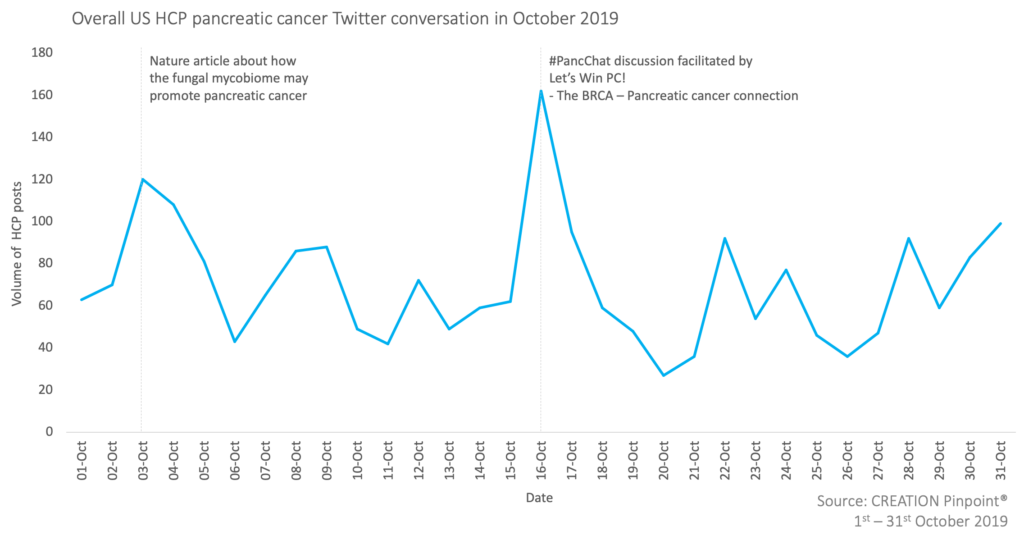Receive monthly updates on the ongoing pancreatic cancer conversation from HCPs online. Sign up for these insights to be delivered direct to your inbox.
This month, healthcare professionals (HCPs) continued to be interested in trials and trial results, providing new insights into pancreatic oncogenesis and treatment of pancreatic cancer. The biggest peak in October’s Twitter HCP conversation around pancreatic cancer was again driven by the Twitter chat #PancChat.

1. PancChat on 16th October about BRCA mutation
In October, #PancChat was held on the 16th of the month and participants discussed the connection between the BRCA mutation and pancreatic cancer. In our pancreatic cancer deep dive study, diagnosis – especially early diagnosis – was a key topic in the pancreatic cancer conversation, and testing for genetic mutations played a significant role. The #PancChat Twitter chat highlighted terminologies used in mutation, as described by Matt Yurgelun.
Prevalence of pancreatic cancer connected to the BRCA mutation was another conversation thread. This thread included HCPs encouraging patients who have been tested, and are positive for the mutation, to enrol in studies.
2. HCPs hopeful about early stage trial result but disappointed by later stage trial results
The top shared link by HCPs was a study article published by Nature journal describing how the fungal mycobiome may promote pancreatic cancer. HCPs responded to this with interest and shared the link as well as news articles about the study widely.
A top story among US HCPs was the positive phase Ib/II trial results of new potential first line treatment triplet regimen NABPLAGEM. HCPs shared the results of the treatment increasing overall survival and overall response rate.
US HCPs also shared negative phase III trial results of Eli Lilly’s SEQUOIA trial in which pegilodecakin plus FOLFOX did not meet its primary endpoint of increased overall survival among pancreatic cancer patients.
The pancreatic cancer space is constantly changing with new trial results and developments in diagnosis and treatment. US HCPs are especially keeping track of these developments and sharing them as well as expressing their opinions. The engagement that the Twitter chat #PancChat receives month-on-month shows the need for continual education and sharing of experience and information among HCPs. There is an opportunity for HCPs to learn from each other and improve patient care as well as for pharmaceutical companies to understand the needs of their HCPs to support them and their patients.
Methodology
- This article analysed the Twitter conversations of HCPs in the US, between October 1 – 31st 2019, using CREATION Pinpoint®.
- Between October 1 – 31st 2019, 1,181 US HCPs posted over 2,000 posts about pancreatic cancer on Twitter.
READ LAST MONTH’S PANCREATIC CANCER TRACKER
The cover image is a false colour SEM image of pancreatic cancer cells, grown in culture.
CREDIT: Anne Weston, Francis Crick Institute used under Creative Commons License.

